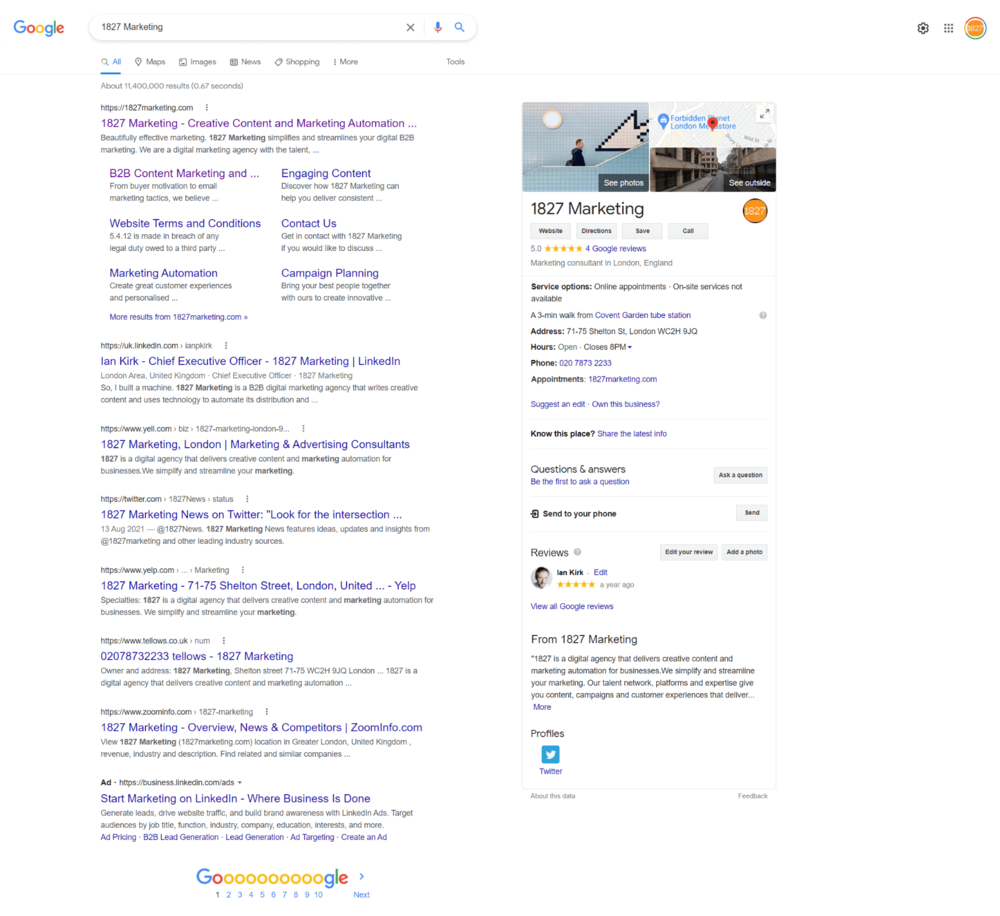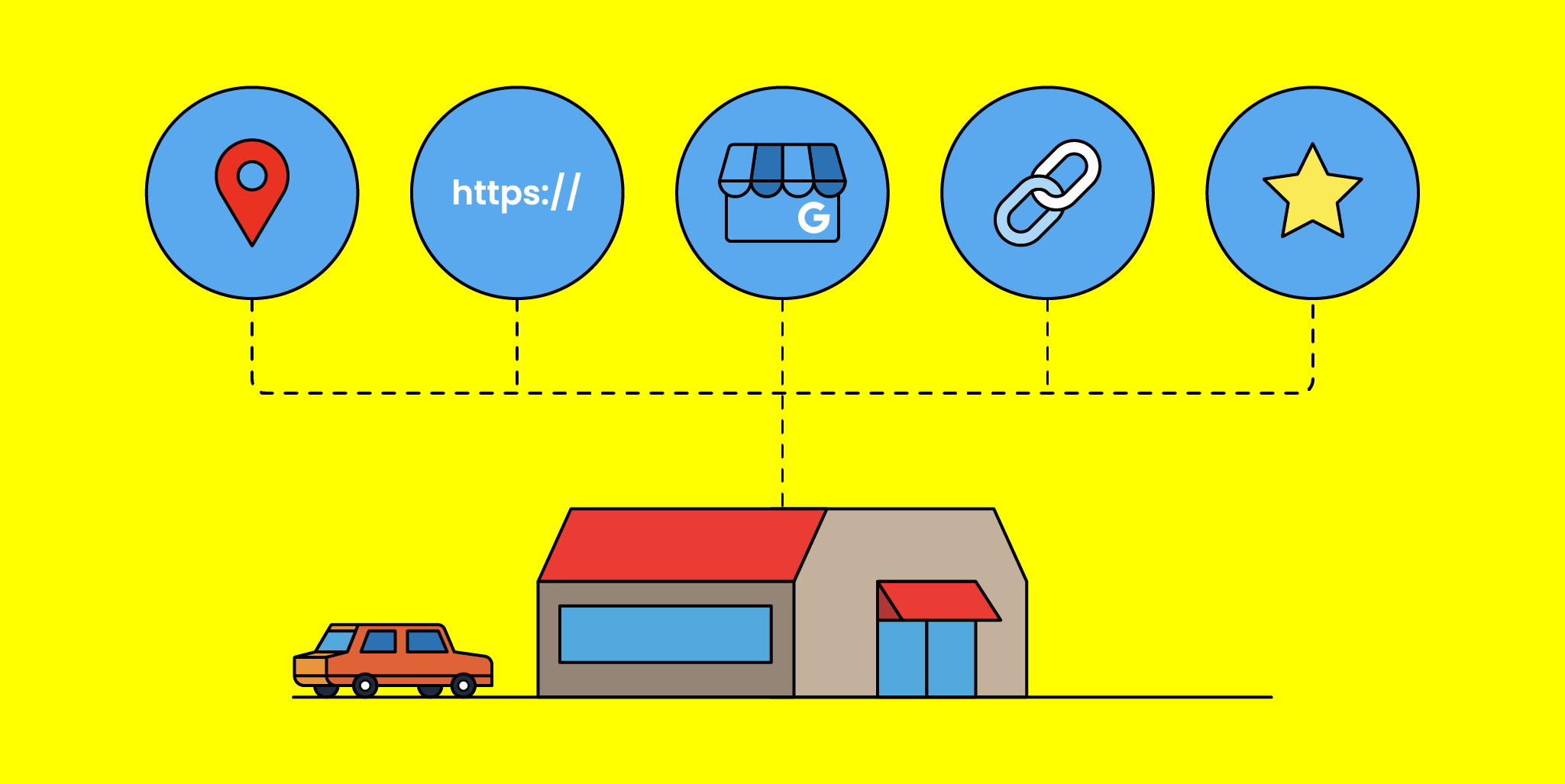Online search is often the starting point in a local consumer’s search for nearby products and services.
In fact, 78% use the Internet to find information about local businesses in their area more than once a week, and 21% conduct local searches every day, according to BrightLocal’s most recent local consumer survey.
You need to be visible in local organic and map pack search results if you want to be found. You then have the opportunity to convert those searchers into in-store traffic, booked appointments, or some other type of paying customer.
In this column, you’ll find 7 of the most impactful ways you can build local visibility using SEO.
1. Check For Technical Errors That Could Impact Indexing
Contents
- 1 1. Check For Technical Errors That Could Impact Indexing
- 2 2. Create Exceptional Content
- 3 3. Incorporate Local Link Building Into Your SEO Strategy
- 4 4. Get Your Google Business Profile In Order
- 5 5. Ensure Local Listings Are Accurate
- 6 6. Monitor & Respond To Local Reviews
- 7 7. Use Relevant Local Schema
- 8 Bringing It All Together
- 9 What are the three core elements of SEO?
- 10 Does SEO work for small business?
- 11 What is SEO strategy plan?
- 12 What is the most important factor involved in local search?
- 13 What is a local SEO strategy?

This is basic SEO. You can’t be found if the search engines can’t index your site.
First, learn the basics of how search engines crawl and index your website. This fundamental knowledge will help guide your SEO efforts in the future.
You may very well decide that technical SEO issues like indexing are too complex for you to manage on top of running your business.
If that’s the case, you’ll at least understand what you’re hiring an SEO agency or consultant to do for you.
On the other hand, you might feel confident looking into indexing issues yourself, and if so, these resources can help:
2. Create Exceptional Content

Content is the vehicle by which all messages, offers and calls to action will be delivered to your audience.
But your small business isn’t just competing against other businesses like yours in search results.
You’re also up against media outlets, informational websites, big brands, local review sites, and all sorts of other sources creating content relevant to your products and services.
The bar is set high and that means your content needs to be exceptional to stand out.
Before you jump in with both feet and start blogging, take the time to create a local content strategy that aligns with your business goals.
Be sure to incorporate different types of local content and optimize each piece for search using these proven on-page local SEO best practices.
3. Incorporate Local Link Building Into Your SEO Strategy

Links are the currency of the web. They are an important trust signal for search engines like Google and suggest that others endorse your content.
John McAlpin explains: “Local links are done with the intention of showing that other people relevant to the local area trust or endorse your business.”
His piece ‘What is a Link Local & How to Find More Local Link Opportunities’, part of our Guide to Local SEO, is a great starting point for your local link building strategy.
From there, I recommend you read this column by Kevin Rowe, in which he shares 50 types of links and what you need to do to attract each one.
4. Get Your Google Business Profile In Order

No local search strategy is complete without a well-optimized Google Business Profile (GBP).
While Google pulls local business information from a wide variety of sites, directories, and networks across the web, it views its own profiles as a single source of truthful information about any local business.
Formerly known as the Google My Business program, these profiles have become richer and more interactive in recent years. And with these updates, they have also become more useful for local search engines.
Today, GBPs not only provide key business information such as your location and contact information, they also allow you to:
Sherry Bonelli offers a great guide to GBP optimization here.
5. Ensure Local Listings Are Accurate

Google values the search experience above all else. Inaccurate and out-of-date information that negatively affects the search engine experience is therefore a liability and can greatly hinder your local visibility.
Wherever a searcher finds your business listing online, whether it’s on social media, a local directory, the yellow pages, review sites like Yelp or Trip Advisor, the information they find there should allow them to convert without a hitch. .
Having the wrong phone number, address, business hours, or other key business information listed can cause a search engine to show up in a closed store, for example.
Or be sent by your GPS system to your previous location.
Seeing multiple versions of key business data on the web makes it difficult for search engines to know what the truth is.
Since Google wants to give each searcher the best possible answer to their query, you don’t want the algorithm to question whether your business information is trustworthy.
Manually tracking listings is time consuming and incredibly difficult as data aggregators and directories can look up business information and update their listings.
This is how misinformation or outdated listings proliferate, and the wrong address, URL, or hours can spread far and wide.
Small businesses can use a local SEO tool like Moz Local or Semrush to automate the process of searching for business listings and monitor their accuracy.
6. Monitor & Respond To Local Reviews
Reviews are a hugely impactful part of the local search experience, and in 2021, 77% of local consumers said they always or regularly read reviews when searching for local businesses.
Google’s local ranking algorithms are less mysterious than their organic counterparts. Google openly tells us that there are three main local ranking factors: relevancy, distance, and prominence.
Reviews are part of the prominence factor, and Google states:
“Google review count and review score factor in local search ranking. More positive reviews and ratings can improve your business’s local ranking.”
Jeff Riddall provides a comprehensive overview of how Google reviews impact local and organic search rankings here.
Take a look at ‘Where & from Matt Southern’ How to Get the Right Reviews for Your Business for more information.
7. Use Relevant Local Schema
While not a ranking factor, schema markup is a type of structured data that makes it easier for web crawlers and helps the search engine better understand the content on your page.
Anything you can do to help Google match your page to a relevant query more effectively is a win.
Schema markup can help trigger rich results that highlight additional information such as breadcrumbs, reviews, FAQs, and sitelinks in search results.
Applying the schema correctly, then testing and validating your markup, is essential as mistakes can disqualify you from getting those rich results.
Chelsea Alves wrote a fantastic guide to local markup and rich results that can serve as a starting point for adding this tactic to your local SEO strategy.
Bringing It All Together
Taking on local SEO as a small business can seem daunting. You may not have a dedicated marketing department, and it’s not uncommon for business owners to feel overwhelmed by the administrative and marketing tasks that come with being an entrepreneur.
I hope this guide provides you with enough information and resources to determine what you can tackle in-house and what you may need to outsource.
Using an agency or consultant to augment your in-house skills is fine, but it’s essential that you have a good understanding of what you’re asking these professionals to do for you.
Remember, local SEO is not a one-time “set it and forget it” activity to tick off the list.
It’s an integral part of your marketing and often intersects with customer service as well.
To learn more, download Search Engine Journal’s eBook ‘Local SEO: The Ultimate Guide to Improving Your Local Search Ranking’.
Featured Image: Shutterstock/Deemka Studio
Local SEO provides better conversion rates by driving targeted traffic and increasing conversion rates. The probability of conversion is higher for those users who are looking for more localized content.
What are the three core elements of SEO?
Navigation site. Internal link. The URL (per page). Relevant and unique content (per page).
What are the core elements of SEO? The 11 Most Important Parts of SEO You Need to Get Right
- Your audience and industry. Your core industry and audience should be the number one consideration behind any viable SEO strategy. …
- Keyword research. …
- User intent. …
- Analysis and reports. …
- Mobile SEO. …
- crawling…
- Indexing. …
- Technical SEO.
Does SEO work for small business?
So does SEO work for small businesses? It should come as no surprise that the answer to this question is yes. Search engines use complex algorithms to deliver the exact results people need, which means that if you provide useful content, you can compete with other small businesses as well as large corporations.
Does SEO help your business? This is the importance of SEO for your business: SEO gives you the power to be the answer to potential customers’ questions. In addition to increasing visibility and traffic, SEO contributes to your authoritative voice in your field. Authority then leads to trust in the brand, which ultimately leads to brand loyalty.
Is SEO worth it for small businesses?
The short answer is that SEO is very effective, not only in generating traffic, but also leads and sales. Don’t worry. The long answer includes research and data, not just empty statements. Most SEOs get too caught up in search specific metrics like SERP (search engine results page), rankings, and organic traffic.
Is SEO worth it 2020?
Short answer: YES! SEO is more important than ever! It remains one of the most powerful digital marketing strategies that generate long-term results. You need correct techniques.
Does SEO really work for small business?
So does SEO work for small businesses? It should come as no surprise that the answer to this question is yes. Search engines use complex algorithms to deliver the exact results people need, which means that if you provide useful content, you can compete with other small businesses as well as large corporations.
How much should a small business pay for SEO?
According to a survey of 1,200 business owners and more than 350 agencies, freelancers, and consultants, the average cost of SEO for small businesses is $501 to $1,000 per month globally. The average cost of SEO for small businesses in the United States is $2,501 to $5,000 per month.
How much does SEO cost for a small business?
According to a survey of 1,200 business owners and more than 350 agencies, freelancers, and consultants, the average cost of SEO for small businesses is $501 to $1,000 per month globally. The average cost of SEO for small businesses in the United States is $2,501 to $5,000 per month.
How much should I spend on SEO?
How much can you expect to spend on SEO? If you are hiring a high-end SEO company to run a local campaign, expect to pay $500.00 per month. A national or international campaign will require a minimum budget of $2,500 to $5,000 per month.
How much should I spend on SEO a month?
To generalize, most SEO experts will charge a monthly recurring investment of $3,000 to $10,000 per month. A national or international SEO budget should never be less than $5,000 per month and it is possible to start a local SEO campaign in the range of $500 to $2,500.
How much does SEO typically cost?
Average SEO costs are $100 to $250 per hour for US SEO agencies. SEO costs often range from $2,500 to $10,000 per month for US agencies. Average SEO costs $2819 per month (per Ahrefs) Overseas SEO companies can charge $10-$50 per hour.
What is SEO strategy plan?
What is an SEO strategy? An SEO strategy is the process of organizing a website’s content by topic to improve the likelihood of it appearing in search results. Essentially, it is the process you follow to maximize the opportunity to get organic traffic from search engines.
What does SEO strategy mean? SEO stands for “search engine optimization” but to fully answer your question, the simple meaning of SEO in marketing your business is the process of improving your website so that search engines like Google are more likely to show up. your business in user search results.
What is a SEO action plan?
An SEO plan lists the steps required to execute the SEO strategy. Search engine optimization plans include a checklist and an SEO action plan template to follow for a website. A good SEO plan improves website ranking and search engine visibility to increase organic traffic.
What are the 3 parts of SEO?
EAT – stands for Experience, Authority and Trust. A commonly used acronym that represents three of the most important elements of SEO. Google seeks to display websites that demonstrate expertise in their field, are authoritative based on a variety of factors, and are trustworthy.
What are the 4 main components of an SEO?
Each component builds on and complements the others. The stronger the connections between each of the 4 SEO components (technical SEO, on-page SEO, off-page SEO, and content), the better the results. Being aware of connections will help us better understand how to best use them effectively.
What is SEO and how do you do it?
Well, SEO stands for ‘Search Engine Optimization’, which is the process of getting traffic from free, organic, editorial, or natural search results on search engines. Its goal is to improve the position of your website on search results pages. Remember, the higher the website is, the more people will see it.
What is the most important factor involved in local search?
When it comes to ranking well in local Google search results, the following are the most important factors: Google My Business. Google My Business Categories. Proximity of the address to the search point.
Why is local search important? Local search can help weed out search engines that are unlikely to contact your business. This is not because search engines are making a concerted effort to protect businesses from customers, but rather because they want to provide locally relevant results based on proximity and intent.
What is a local SEO strategy?
What is local SEO? Local SEO (Search Engine Optimization) is the process of improving search engine visibility for local businesses, primarily those with physical locations. By following local SEO best practices, businesses can improve organic traffic from customer searches in nearby areas.
Why is local SEO important for SEO? Local SEO allows you to put important information about your site online, such as your business address and phone number. Additionally, you can highlight and promote the type of products or services you offer on your website using SEO techniques.
What local SEO includes?
What is local SEO? Local SEO is the practice of optimizing a website to increase traffic, leads, and brand awareness from local search. Common tasks associated with local SEO include searching for local keywords, optimizing a company’s Google My Business profile, and creating “NAP” citations.
What comes under local SEO?
Local SEO is a search engine optimization (SEO) strategy that helps make your business more visible in local search results on Google. Any business that has a physical location or serves a geographic area can benefit from local SEO.
What means local SEO?
Local SEO is the practice of optimizing your website for a specific local area. If you have a local business, such as a store, restaurant, or agency, you want your web pages to rank for certain search queries made by a local audience.
What is the difference between SEO and local SEO?
Here is the difference. While traditional SEO focuses on improving your site’s visibility on a national or global scale, local SEO allows you to capture local search territory to connect with search engines in your area.
What is local SEO?
Local SEO is a search engine optimization (SEO) strategy that helps make your business more visible in local search results on Google. Any business that has a physical location or serves a geographic area can benefit from local SEO.
What is the difference between local and organic SEO?
Based on these definitions, we can establish the fundamental difference between local and organic SEO: local SEO is about optimizing placements, while organic SEO is about optimizing content. They both have to do with optimizing your website and online presence for search engines.
